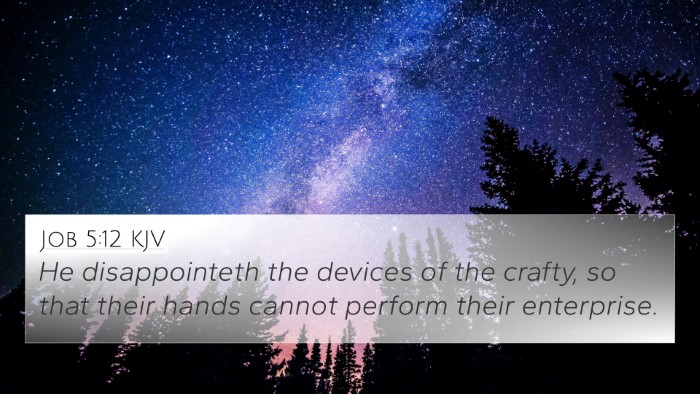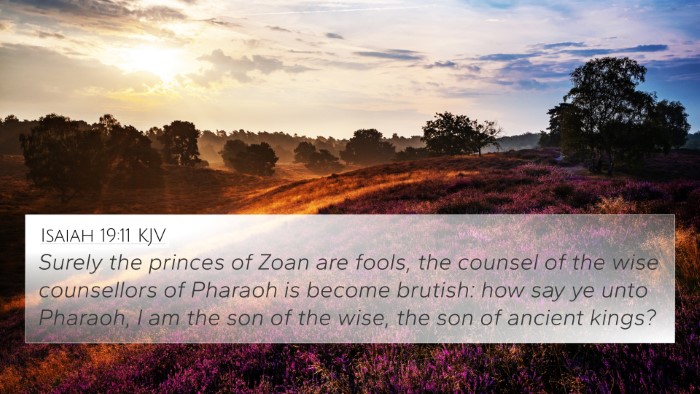Understanding Jeremiah 8:9
Jeremiah 8:9 states: "The wise men are ashamed, they are dismayed and taken: lo, they have rejected the word of the Lord; and what wisdom is in them?"
This verse speaks about the failure of the wise men of Israel to uphold the truth and wisdom of God's word. In this context, the prophet Jeremiah laments the inability of Israel's leaders and people to recognize the dire consequences of their disobedience.
Summary of Insights
Insights from various public domain commentaries reveal several important themes within this verse:
-
Rejection of God’s Word: The primary focus of this verse emphasizes how the wise men, who are regarded as knowledgeable and judicious, have turned away from the guidance of the Lord. This refusal leads to their shame and dismay (Matthew Henry).
-
Wisdom vs. Worldly Knowledge: Albert Barnes points out that true wisdom stems from a relationship with God. The rejection of divine truth results in a kind of false wisdom that ultimately leads to moral and spiritual failure.
-
Consequences of Apostasy: Adam Clarke explains that the shame and despair of the wise men are not merely personal but reflect a broader national crisis where the leadership is failing to guide the people toward righteousness.
Biblical Context
The broader context of Jeremiah 8:9 is critical for understanding its implications. Jeremiah is addressing a people in rebellion, whose leaders, despite their supposed wisdom, have misled the flock.
This theme resonates throughout the book of Jeremiah and highlights the tension between human wisdom and divine revelation.
Cross-References to Jeremiah 8:9
To gain further insight into Jeremiah 8:9, one can look at several related verses:
- Proverbs 1:7: "The fear of the Lord is the beginning of knowledge: but fools despise wisdom and instruction."
- Isaiah 29:14: "Therefore, behold, I will again do a marvelous work among this people, a marvelous work and a wonder: for the wisdom of their wise men shall perish, and the understanding of their prudent men shall be hid."
- 1 Corinthians 1:19: "For it is written, I will destroy the wisdom of the wise, and will bring to nothing the understanding of the prudent."
- Jeremiah 4:22: "For my people is foolish, they have not known me; they are sottish children, and they have none understanding: they are wise to do evil, but to do good they have no knowledge."
- Hosea 4:6: "My people are destroyed for lack of knowledge: because thou hast rejected knowledge, I will also reject thee, that thou shalt be no priest to me: seeing thou hast forgotten the law of thy God, I will also forget thy children."
- James 1:5: "If any of you lack wisdom, let him ask of God, that giveth to all men liberally, and upbraideth not; and it shall be given him."
- Romans 1:22: "Professing themselves to be wise, they became fools."
Thematic Connections
The core message of Jeremiah 8:9 engages in an inter-Biblical dialogue regarding the concepts of wisdom, knowledge, and apostasy. The rejection of God’s word has persistent and tragic consequences outlined throughout the Scriptures.
Exploring these connections enhances our understanding of how spiritual insight is intertwined with divine revelation across both the Old and New Testaments.
Tools for Bible Cross-Referencing
To delve deeper into cross-referencing Biblical texts, the use of specific tools is invaluable. In studying Jeremiah 8:9 and its implications, consider leveraging:
- Bible Concordance: An essential reference tool that helps identify where specific words and themes appear throughout the Bible.
- Cross-Reference Bible Study Guides: These guides aid in tracing thematic links between verses, enriching comprehension.
- Bible Chain References: A method of connecting passages that explore similar concepts or teachings across the Scriptures.
- Comprehensive Bible Cross-Reference Materials: Resources that provide extensive lists of related verses for deeper study.
- Cross-Referencing Bible Study Methods: Techniques that facilitate deeper engagement with the text through comparative analysis.
Conclusion
Jeremiah 8:9 serves as a powerful reminder of the importance of adhering to God's wisdom found in Scripture. The rejection of divine truth leads to dismay, and understanding this principle allows for a richer interpretation of God’s message.
By employing cross-references, engaging with related passages, and using helpful study tools, readers can uncover profound truths woven throughout the Bible.
The insights gained from this verse encourage a deepened relationship with God and an earnest pursuit of His wisdom.














